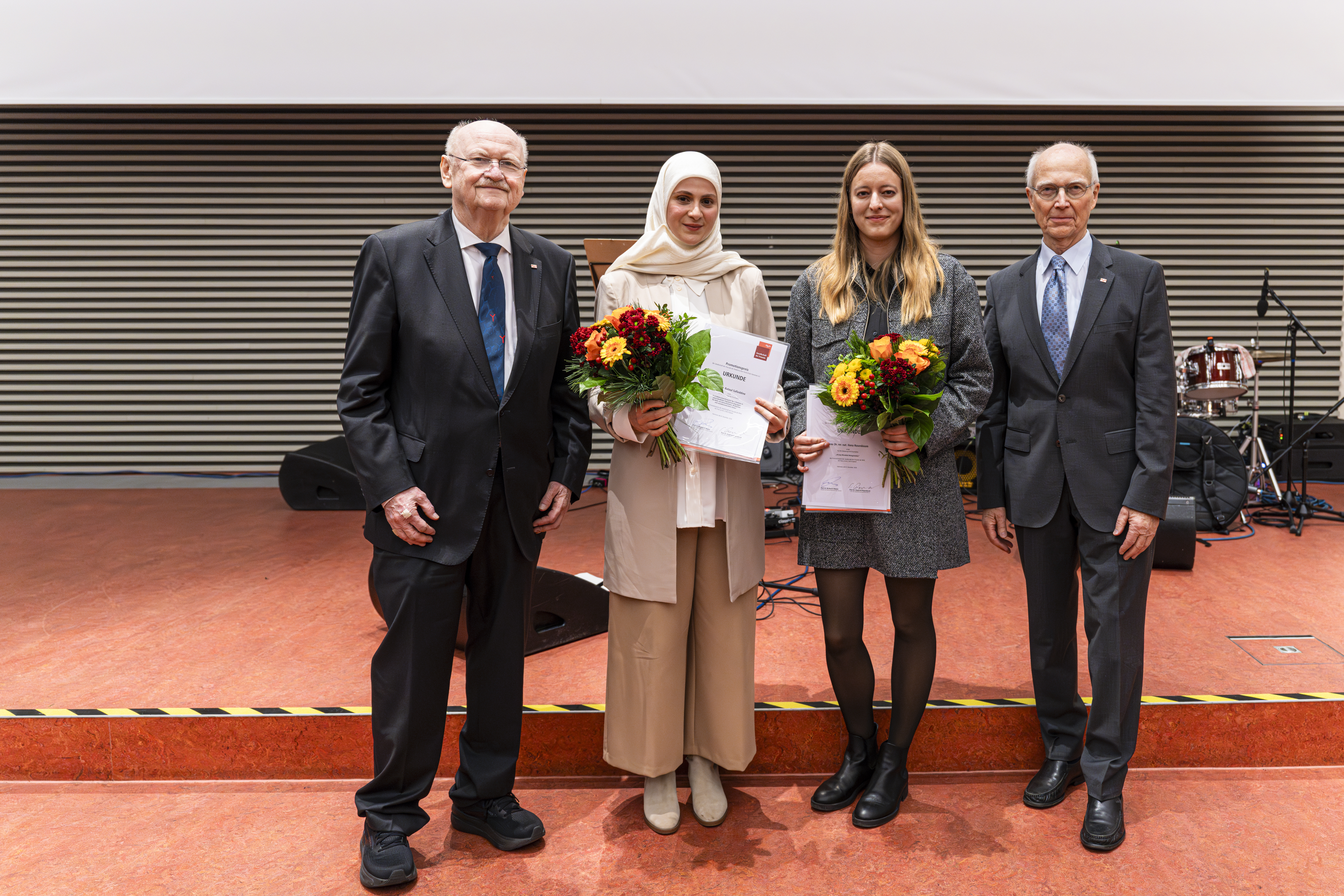Gesellschaft der Freunde der MHH e.V. honours two outstanding doctoral theses.

Hannover Medical School (MHH) stands for diversity and this is also evident at the doctoral ceremony with students from 82 nations. MHH President Prof. Dr Michael Manns emphasised this international diversity when he presented 139 doctoral certificates to 86 female doctoral candidates and 53 male doctoral candidates last Friday. These include 54 female and 37 male doctors, eight female and four male dentists, 15 female and 10 male natural scientists, four female and one male human biologist and five female and one male doctoral candidate in public health.
The MHH President once again personally presented the doctoral certificates to the doctoral candidates during a ceremony at the university. A total of 20 of them graduated ‘with honours’; two received the doctoral prizes of 2,500 euros each from the Gesellschaft der Freunde der MHH e.V. The two prizes for outstanding doctoral theses were presented by Prof. Dr Siegfried Piepenbrock, Chairman of the Gesellschaft der Freunde der MHH e.V. to: Dr rer. nat. Ilona Rosenboom, MHH Clinic for Paediatric Pneumology, Neonatology and Allergology, and Dr PH Batoul Safieddine, MHH Institute for Medical Sociology are the doctoral prize winners.
Software for recognising microorganisms
In her doctoral thesis entitled ‘Airway Microbial Metagenomics’, Dr Ilona Rosenboom used high-throughput sequencing of genomic DNA to analyse the lung microbiome, the community of microorganisms living in the lungs, in detail. In collaboration with bioinformaticians from the Research Core Unit Genomics at the MHH, the biochemist at the Department of Paediatric Pneumology, Neonatology and Allergology developed the ‘Weekend’ pipeline: a comprehensive software package for the quantitative detection of viruses, bacteria and fungi at species level.
This pipeline was used for several clinical questions. One sub-project of the dissertation investigated the development of the respiratory microbiome of premature babies. The analysis showed that medical interventions such as antibiotics and ventilation have a negative impact on the composition of the microbiota in premature babies. Even after almost two years, premature babies showed an immature microbiome composition compared to healthy children of the same age.
In another sub-project on the lung microbiome of patients with bronchiectasis, the doctoral student was able to show that harmful pathogens displace the natural bacterial community as the severity of the disease increases. Clinically important was the finding that even an apparently normal lung microbiome can be associated with a severe course of the disease.
Dr Rosenboom did pioneering work by identifying a depletion of the microbiome of health-associated bacterial species in patients with bronchiectasis in a first-time comparison with a large control cohort of healthy volunteers. This discovery could be of particular importance for the monitoring of progression and therapy. The dissertation resulted in five original publications in recognised scientific journals, with Dr Rosenboom being the first author of four papers. Her doctoral supervisor is Prof Dr Burkhard Tümmler.
Morbidity expansion in type 2 diabetes
Dr PH Batoul Safieddine completed her Master's degree in Public Health at the MHH and her doctorate at the MHH Institute of Medical Sociology, where she is a research assistant in the research area ‘Morbidity compression and its alternatives’.
In her doctoral thesis entitled ‘Morbidity development in type 2 diabetes in different population subgroups: The role of comorbidities, medication and socioeconomic status’, Dr Safieddine investigated the development of morbidity in individuals with type 2 diabetes (T2D) in Germany using anonymised data from the AOK Lower Saxony. The analyses were organised according to various social characteristics in order to comprehensively capture vulnerable population subgroups. The results show that although people with T2D live longer, they suffer more frequently from concomitant diseases - a phenomenon known as ‘morbidity expansion’. While serious health events such as heart attacks occur less frequently, burdensome chronic diseases such as nerve damage and kidney disease are on the rise in all socio-economic groups analysed.
The analyses also showed that drug treatment was intensified over time, which argues against deficits in medical care as the cause of the morbidity expansion and directs the focus to a possible deterioration in lifestyle as an explanatory factor, particularly with regard to physical activity and diet. The results of this doctoral thesis thus emphasise the importance of preventive approaches to promote a healthy lifestyle in order to sustainably improve the quality of life of people with T2D and counteract this worrying trend in morbidity. Her doctoral supervisor is Prof Dr Siegfried Geyer.
Text: Bettina Dunker